英语科技论文常用句型结构-new
英语科技论文常用句式结构
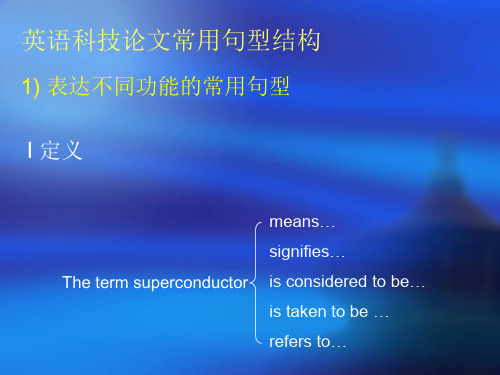
Another typical example is …
Ⅸ 状态的转换或变化
change
transfer
convert … (变化前) to into … (变化后)
transform
translate
The silicon controlled rectifier is able to change
英语科技论文常用句型结构
1) 表达不同功能的常用句型 Ⅰ 定义
means… signifies… is considered to be… is taken to be …
The term superconductor
refers to…
In this article
In this paper
will be taken to mean … will be used in the … network
treated in this standard.
Although both the planer and the shaper are adapted
to the machining of flat surfaces, they differ widely in construction and in method of operation.
Iron unlike rubber, is a good conductor of electric
current.
C. 相当于
One turn of the hand-wheel is equivalent to 2 mm
stroke.
For finishing electrodes, the foil thickness
科技论文的常用句型与写作要点
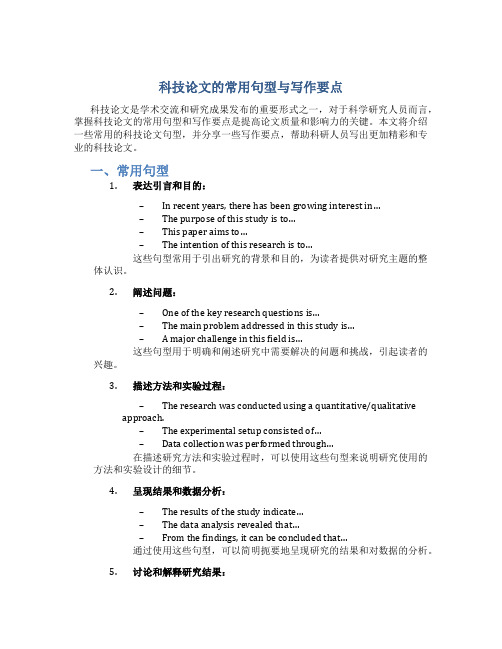
科技论文的常用句型与写作要点科技论文是学术交流和研究成果发布的重要形式之一,对于科学研究人员而言,掌握科技论文的常用句型和写作要点是提高论文质量和影响力的关键。
本文将介绍一些常用的科技论文句型,并分享一些写作要点,帮助科研人员写出更加精彩和专业的科技论文。
一、常用句型1.表达引言和目的:–In recent years, there has been growing interest in…–The purpose of this study is to…–This paper aims to…–The intention of this research is to…这些句型常用于引出研究的背景和目的,为读者提供对研究主题的整体认识。
2.阐述问题:–One of the key research questions is…–The main problem addressed in this study is…– A major challenge in this field is…这些句型用于明确和阐述研究中需要解决的问题和挑战,引起读者的兴趣。
3.描述方法和实验过程:–The research was conducted using a quantitative/qualitative approach.–The experimental setup consisted of…–Data collection was performed through…在描述研究方法和实验过程时,可以使用这些句型来说明研究使用的方法和实验设计的细节。
4.呈现结果和数据分析:–The results of the study indicate…–The data analysis revealed that…–From the findings, it can be concluded that…通过使用这些句型,可以简明扼要地呈现研究的结果和对数据的分析。
科技论文的常用句型与写作要点

科技论文的常用句型与写作要点科技论文的常用句型与写作要点在撰写科技论文时,合理的句型和写作要点能够使文章更加准确清晰地传递信息。
下面是一些常用的句型和写作要点,希望能对你的科技论文写作有所帮助。
一、引言部分1. 开篇引出研究主题- Nowadays, with the rapid development of technology, the issue of [研究主题] has gained significant attention.- In recent years, [研究主题] has become an important topic in the field of [相关领域].- The study of [研究主题] has attracted growing interest in both academia and industry.- The purpose of this paper is to investigate [研究主题] and propose a novel approach to address this problem.2. 简述研究现状和研究意义- Previous studies have shown that [现有研究结果].- However, there are still some unresolved issues in this area, including [未解决问题].- Therefore, it is necessary to further explore [研究主题].- The findings of this study will contribute to our understanding of [研究主题] and provide practical guidance for [相关领域].二、方法部分1. 描述研究对象- The samples used in this study were [样本来源和特点].- In order to achieve a representative sample, we selected [选择方法].- The data was collected from [数据来源] and verified by [其他数据].2. 介绍研究设计- This study adopts a [研究设计] approach.- A combination of [多个方法] was used to analyze the data.- We conducted a series of experiments to test the hypothesis.3. 讨论研究结果- The results indicate that [结果].- Our findings suggest that [发现].- It can be concluded that [总结].- The results are consistent with previous studies, which support the validity of our hypothesis.三、讨论部分1. 解释研究结果- The observed differences can be attributed to [解释原因].- It is likely that [可能原因].- The variation in [结果] may be due to [原因].- These findings provide evidence for [研究结论].2. 探讨研究局限性- One limitation of this study is that [局限性].- The sample size was relatively small, which may affect the generalizability of the findings.- Future research should consider [应注意问题].3. 提出研究建议- Future studies should focus on [进一步研究方向].- It is recommended that [建议].- More research is needed to explore the impact of [研究主题] on [相关领域].- Practical implications and potential applications of the findings should also be considered.四、结论部分1. 简述研究成果- In summary, this study has provided valuable insights into [研究主题].- The findings of this study contribute to our understanding of [研究主题].- These results have important implications for [相关领域].2. 总结研究贡献- This study has advanced the knowledge in [相关领域].- The methodology and findings of this study can be applied in [其他领域].- The results of this study fill a gap in the literature and provide afoundation for future research.3. 展望未来研究方向- Future research should focus on [发展方向].- It is recommended to explore [进一步研究内容].- Further investigation is needed to address [相关问题].总之,科技论文的写作要点包括明确引出研究主题、描述研究方法、讨论研究结果和提出研究建议。
new科技英语1
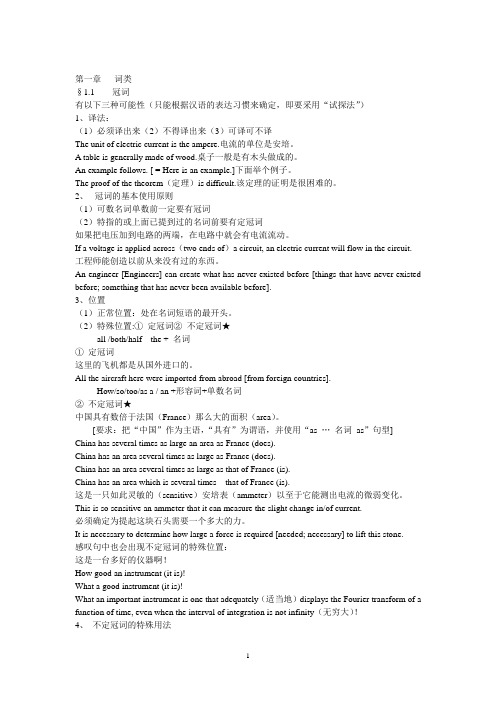
第一章词类§1.1 冠词有以下三种可能性(只能根据汉语的表达习惯来确定,即要采用“试探法”)1、译法:(1)必须译出来(2)不得译出来(3)可译可不译The unit of electric current is the ampere.电流的单位是安培。
A table is generally made of wood.桌子一般是有木头做成的。
An example follows. [ = Here is an example.]下面举个例子。
The proof of the theorem(定理)is difficult.该定理的证明是很困难的。
2、冠词的基本使用原则(1)可数名词单数前一定要有冠词(2)特指的或上面已提到过的名词前要有定冠词如果把电压加到电路的两端,在电路中就会有电流流动。
If a voltage is applied across(two ends of)a circuit, an electric current will flow in the circuit. 工程师能创造以前从来没有过的东西。
An engineer [Engineers] can create what has never existed before [things that have never existed before; something that has never been available before].3、位置(1)正常位置:处在名词短语的最开头。
(2)特殊位置:①定冠词②不定冠词★all /both/half the + 名词①定冠词这里的飞机都是从国外进口的。
All the aircraft here were imported from abroad [from foreign countries].How/so/too/as a / an +形容词+单数名词②不定冠词★中国具有数倍于法国(France)那么大的面积(area)。
英文科技论文写作常用句型
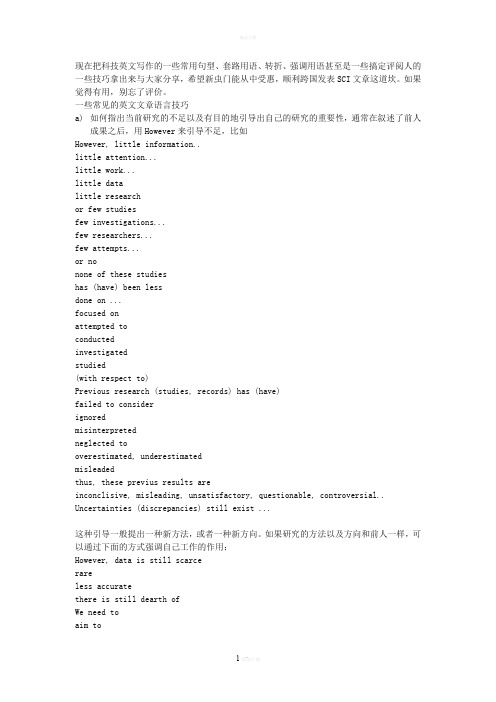
现在把科技英文写作的一些常用句型、套路用语、转折、强调用语甚至是一些搞定评阅人的一些技巧拿出来与大家分享,希望新虫门能从中受惠,顺利跨国发表SCI文章这道坎。
如果觉得有用,别忘了评价。
一些常见的英文文章语言技巧a)如何指出当前研究的不足以及有目的地引导出自己的研究的重要性,通常在叙述了前人成果之后,用However来引导不足,比如However, little information..little attention...little work...little datalittle researchor few studiesfew investigations...few researchers...few attempts...or nonone of these studieshas (have) been lessdone on ...focused onattempted toconductedinvestigatedstudied(with respect to)Previous research (studies, records) has (have)failed to considerignoredmisinterpretedneglected tooverestimated, underestimatedmisleadedthus, these previus results areinconclisive, misleading, unsatisfactory, questionable, controversial.. Uncertainties (discrepancies) still exist ...这种引导一般提出一种新方法,或者一种新方向。
如果研究的方法以及方向和前人一样,可以通过下面的方式强调自己工作的作用:However, data is still scarcerareless accuratethere is still dearth ofWe need toaim tohave toprovide more documentsdatarecordsstudiesincrease the datasetFurther studies are still necessary...essential...为了强调自己研究的重要性,一般还要在However之前介绍自己研究问题的反方面,另一方面等等比如:1)时间问题如果你研究的问题时间上比较新,你就可以大量提及对时间较老的问题的研究及重要性,然后说(However),对时间尺度比较新的问题研究不足2)物性及研究手段问题如果你要应用一种新手段或者研究方向,你可以提出当前比较流行的方法以及物质性质,然后说对你所研究的方向和方法,研究甚少。
英文科技写作句型和词汇表达总结
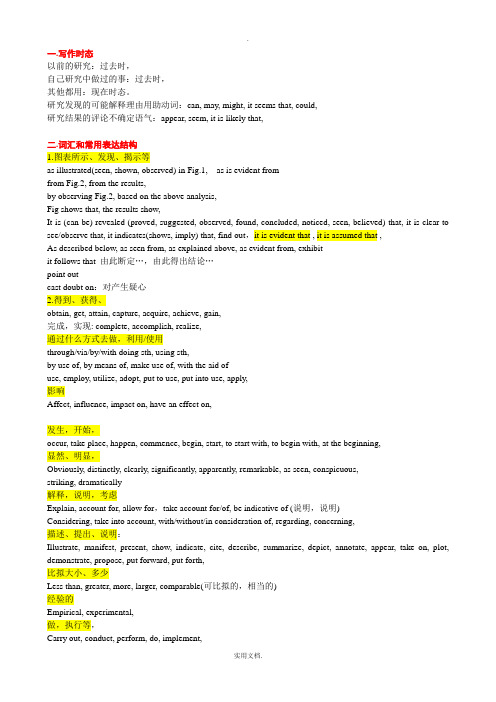
以前的研究:过去时,自己研究中做过的事:过去时,其他都用:现在时态。
研究发现的可能解释理由用助动词:can, may, might, it seems that, could,研究结果的评论不确定语气:appear, seem, it is likely that,二.词汇和常用表达结构1.图表所示、发现、揭示等as illustrated(seen, shown, observed) in Fig.1, as is evident fromfrom Fig.2, from the results,by observing Fig.2, based on the above analysis,Fig shows that, the results show,It is (can be) revealed (proved, suggested, observed, found, concluded, noticed, seen, believed) that, it is clear to see/observe that, it indicates(shows, imply) that, find out,it is evident that , it is assumed that ,As described below, as seen from, as explained above, as evident from, exhibitit follows that 由此断定…,由此得出结论…point outcast doubt on:对产生疑心2.得到、获得、obtain, get, attain, capture, acquire, achieve, gain,完成,实现: complete, accomplish, realize,通过什么方式去做,利用/使用through/via/by/with doing sth, using sth,by use of, by means of, make use of, with the aid ofuse, employ, utilize, adopt, put to use, put into use, apply,影响Affect, influence, impact on, have an effect on,发生,开始,occur, take place, happen, commence, begin, start, to start with, to begin with, at the beginning,显然、明显,Obviously, distinctly, clearly, significantly, apparently, remarkable, as seen, conspicuous,striking, dramatically解释,说明,考虑Explain, account for, allow for,take account for/of, be indicative of (说明,说明)Considering, take into account, with/without/in consideration of, regarding, concerning,描述、提出、说明:Illustrate, manifest, present, show, indicate, cite, describe, summarize, depict, annotate, appear, take on, plot, demonstrate, propose, put forward, put forth,比拟大小、多少Less than, greater, more, larger, comparable(可比拟的,相当的)经验的Empirical, experimental,做,执行等,Carry out, conduct, perform, do, implement,Have a good agreement, in good agreement with, match very well with, agree well with, show good agreement, in full agreement with, in line withcorresponding to/with, consistent with, in good accordance with, coincide with, concord with, fit well with研究,调查Study, investigate, explore, exploratory examine, make an investigation on/of/into, carry out a research到达,To reach this objectiveReach, approach, up to, add up to, come to, arrive, beyond, out of reach,验证,假设Validate, verify, justify,hypothesizeAssume, suppose, assumption, hypothesis,assume to be, it is assumed that… postulate 公设增加、上升、减少、下降Increase, decrease, reduce, reduce to, increase by(增加了多少), increase up to(增加到), rise to, give rise to, sth arise, increase with (随…增长/增加)完全地,根本地,详细地,具体地,深入的,类似地,Completely, entirely, adequately, mostly, extremely, truly, indeed, really, actually, mainly, primarily, detailed, in detail, in great detail, in more detail, for more details,Deeper, deeply, better, in depth,similarly, inadequately, notably, overly(过度地、极度地),Experimentally,改善、提高:improve, promote, boost, enhance, facilitate,相关,包括,大约大概:concerned with, relate to, with regard to,Be involved in/with, with respect to, be concerned with, as for,Around, about, approximately,决定:determine, decide, depend on ,rely on目的、试图:an attempt to, aim at, in an attempt to, the objective is, in order to, the aim of is tothe aim of this research is to do the purpose is , be aimed at,经历,保持: hold, keep, undergo, experience, remain, retain,导致:cause, induce, lead to, result in, originate from, arise from,根据,基于:according to, in terms of, in the light of, judge by, on the basis of, in view of, based on,On behalf of, in the form of, referring to, with reference to, in reference to除了:other than, apart from, with the exception of, except for/that, besides, in addition, additionally,理论上,事实上:in principle, in practice, in fact, in reality, in theory, theoretically,从某种程度上:To some extent, to a large/certain extent, in a way, in a sense, to some degree, in some sense,from the viewpoints of , from the perspective of,得出结论:draw a conclusion, come to/reach a conclusion,推断,猜想:Infer,derive from, deduce, speculate,认为,当作Consider as, regard as, refer to as,建立模型establish, create,build,run/do the simulationin the case of : 在…情况下遵循趋势:obey, follow trend, tendency,组成consist of , contain, be composed of, include,强调:highlight, emphasize, lay emphasis on , the emphasis is layed on集中:focus on, concentrate on , be centered on设定为to set to be区分、区分:discern,differentiate,identify as,其他专业词汇表达small batch production, small quantity production, high volume production, mass production,metal-formed product, micro-formed part,reproducibility: 再现性、重复性experimental determination,in particular, especially,评估,评价:evaluate, assess,扮作:act as,别离,隔绝,separate from, isolate, set apart from缺少:in the absence ofby convention:按照传统,惯例,使成为:make sth sthno longer〔不再〕but rather(相反的)be typical of (典型的)成反比:inversely scale with涉及,牵涉到:involve, cover,拓展:extend into最近,新近more recently,到目前为止,迄今to date,解释、提示原因或结果的转接词:attribute to, because, as a result of, therefore, thereby, in general, consequently, as predicted, in conclusion, since, as for, finally, hence, thus, as, for, due to, in summary, because of, when, cause, on account of, result in, owing to, contribute to, thanks to, lead to, the reason is, that is because, devoted to, accordingly, as a consequence of, arise from起逻辑演进作用的转接词:递进关系,不但…而且…等Furthermore, in addition, besides, first, second, third, finally, lastly, moreover, incidentally, in fact, in truth, as a matter of fact, for example, such as, next, then, for instance, take an instance of , likewise/as such(同样), again〔此外〕, at root, as well as, as follows, in the following, below, based on, above, above-mentioned, aforementioned, as with(正如,与一样,就来说),as noted(正如前面所提到的),additionally, in parallel,as stated( 如上所述)meanwhile:同时比照词,表示逻辑演进方向即将改变如但是等But, however, instead, nevertheless, despite, surprisingly, in spite of, nonetheless, in/by contrast to/with , for comparison, whereas, while, even though, although, compared with, regardless of, as compared to, with regard to, in relation to, by contrast, irrespective of, in comparison to与联系,联合:in association with同时,同样的,at the same time, in the same way, in the same time对应关系A vs.B versus三.英文研究论文中的表达句子substitute equation (1) into equation (2)把代入等式The scale in Fig (a) runs from black for low values to white for the highest Schmid factors.offers more insight into,holds for all three materials,四.英文科技论文中的语言技巧,不可不看a)如何指出当前研究的缺乏以及有目的地引导出自己的研究的重要性通常在表达了前人成果之后,用However来引导缺乏,比方However, little information..little attention...little work...little datalittle researchor few studiesfew investigations...few researchers...few attempts...or nonone of these studieshas (have) been lessdone on ...focused onattempted toconductedinvestigatedstudied(with respect to)Previous research (studies, records) has (have)failed to considerignoredmisinterpretedneglected tooverestimated, underestimatedmisleadedthus, these previous results areinconclusive, misleading, unsatisfactory, questionable, controversial.. Uncertainties (discrepancies) still exist ...这种引导一般提出一种新方法,或者一种新方向。
科技论文写作常用句型

科技论文写作常用句型1.摘要(1)文章内容与作者观点•常用词:deal with ,describe ,explain ,illustrate(vt) ,introduce ,present ,report等。
•例句:The basic concepts and data collected are presented.给出了基本概念和所采集的数据。
(2)文章研究课题:•常用词: analyze(vt),consider ,develop ,discuss ,investigate(调查研究) ,state ,study等。
•例句:The relationship between mass(质量) and energy in nature is discussed briefly.简要地讨论自然界中质量与能量的关系。
(3)文章涉及范围•常用词:consist of ,contain ,cover ,include 等。
•例句:This article consists of four parts : introduction,theory ,experimental method ,and conclusion.本文由引言、理论、实践方法与结论四部分组成。
(4)综述某一个领域的研究课题。
•常用词:abstract ,outline ,review ,summarize 等。
•例句: The theory based on materials science is summarized briefly.简单概述了基于材料科学的理论。
(5)文章重点:•常用句型: Attention i s concentrated on …T here is a focus on …A ttention is paid to …T he emphasis is on …•例句:Attention is concentrated on grasping the quantum theory.重点在掌握量子理论上。
03-1科技英语论文写作-词组和句型结构

• These have helped us in improving the quality of the paper greatly. substantially
• But it doesn’t solve the problem suitably due to
its neglect of constraints
• Highly specialized (高度的专业性) the use of special terms (术语):rigor and oneness (严 谨性和单一性 ) of terms ensure the exactness of meaning and conciseness of sentences
Formal vs Informal demonstrate/indicate
• Our simulation results show that the proposed discrete adaptive NC-QAM/PSK schemes are capable of attaining a higher…
Features of EST
• Formal style (文体正式) 1) formal words: avoid colloquial words and 1st, 2nd personal pron. (I, you) 2) structural and logical preciseness 3) objective vs. subjective (passive vs. active)
Characteristics of Words in Scientific Articles
1. general vs specific
科技论文中常用的句式
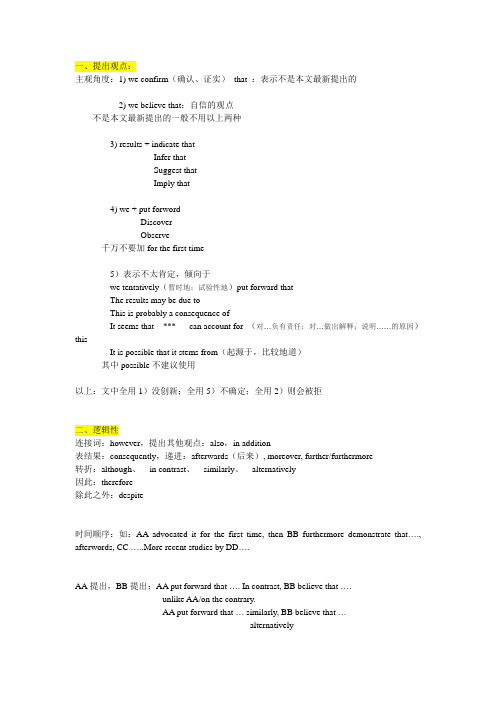
一、提出观点:主观角度:1) we confirm(确认、证实)that :表示不是本文最新提出的2) we believe that:自信的观点不是本文最新提出的一般不用以上两种3) results + indicate thatInfer thatSuggest thatImply that4) we + put forwordDiscoverObserve千万不要加for the first time5)表示不太肯定,倾向于we tentatively(暂时地;试验性地)put forward thatThe results may be due toThis is probably a consequence ofIt seems that *** can account for (对…负有责任;对…做出解释;说明……的原因)thisIt is possible that it stems from(起源于,比较地道)其中possible不建议使用以上:文中全用1)没创新;全用5)不确定;全用2)则会被拒二、逻辑性连接词:however,提出其他观点:also,in addition表结果:consequently,递进:afterwards(后来), moreover, further/furthermore转折:although、in contrast、similarly、alternatively因此:therefore除此之外:despite时间顺序:如:AA advocated it for the first time, then BB furthermore demonstrate that…., afterwords, CC …..More recent studies by DD….AA提出,BB提出:AA put forward that …. In contrast, BB believe that ….unlike AA/on the contrary.AA put forward that … similarly, BB believe that …alternativelyalso句子间用:firstly,…secondly….三、其他1. 第一次缩写,必须要写说明:如CSP for short…,或者we present a new mobility model, called Selfsimilar Least-Action Walk (SLAW),不要全盘否定前人成果(即使认为不对),不要说their results are wrong或者very questionable 或has no commonsense可以说their studies may be more reasonable if they had….Considered this situation….their results could better convinced that …their conclusion may remain some uncertains…2. 不是综述不写future work提别人的错误,用在讨论中比较提自己的不足:1) it should be noted that this study has research/focus on only…2)Some limitation of this study are …We have pointed that ..上述两种说法指出文章的片面性提出不足后,要能转回来,否则不提:1)the results do not imply…2)the results can not be used to determine …3)unfortunately, we can not determine this from this data4)our results are lack of …转回来:Not withstanding its limitation, this study does suggest….(解决不了)Not withstanding:虽然However,these problems can be solved if….3. 参考文献尽量新,写审稿人、权威作者的文献尽量不写et al. 两个作者一定都要写,写页数,加上自己的论文。
科技英语写作中的常用句式

二、“限定范围”的句式
限定主题范围的句式用语,在英文科学论文 中常出现在“引言”和“讨论”中。
限定主题范围时的常用表达有:“该问题是 关于……的研究”,“该问题在……范围之 内(外)”,“该问题涉及到……范围”, “该问题可进一步推广到……范围”等等。
aspects of the following…
(3)该项工作的主要目的是…
① The chief aim of the present work is to investigate the features of …
② The main purpose of our recent work was to examine the properties of…
③ The major object of their further work will be research into the nature of…
④ Our work in this direction has been intended to provide some information about…
reveal…
(5)该项实验主要是为了
① We made these experiments in order to show a correlation between…
② The author attempted the set of experiment with a view to demonstrate certain phenomena…
掌握分类句式用语有利于比较地道、规范的 英语表达。
科技英语写作中的常用写作句型归纳与总结(新)

科技英语写作常用写作句型归纳与总结1、对……作一分析/研究/比较make an analysis of …make a study of …make a comparison of A with/and Bmake a comparison between A and B2、对……作一介绍/描述/解释give an introduction to …give a description of …give an explanation of …3、对……的研究/分析/比较表明……A study of … shows that…An analysis of … shows that…4、我们必须……It is necessary for us to do…We must do…5、我们能够……It is possible for us to do…We can do…We are able to do…We are capable of doing…We are in a position to do…6、值得注意的是……It is worth noting that…What is worth noting is that…7、必须解这个方程把未知数求出来。
It is necessary to solve the equation for the unknown.8、直接应用这个定律我们就可以得到……Direct application of this law yields/gives/produces/results in/leads to…By direct application of this law we obtain/have/get…9、可取的/恰当的做法是……It is well/proper/appropriate to do…10、我们想要……We wish to do…One wishes to do…It is desired to do…11、本书已经出版三年了。
科技论文常用英语句型葵花宝典

Part One 科技论文写作英语句型库一、摘要This paper derives the…This paper puts forward a new method to …二、引文研究目的((purpose of the study)1.研究目的This problem concerned (deals, bears)(briefly, meanly, largely) with …This is a problem relating to …Our work is devoted to…The Primery goal of the present research is..The work presented in this paper focuses in…The work presented in this paper focuses on several aspects of …The chief aim of study is …The laboratory study demonstrates (suggestes, indicates, reveals, establishes) …Doing this work, we intend (hope, expect, attempt) to…Carry out (undertaking, performing, initiating) this study, we hope to …The principal purpose (objective, task) of the present (preliminery, further) work is to investage the features of (mechanisms involved in, effects prodused by) …背景和历史((background and history)2.背景和历史This problem was (first) advanced by …The Problem under discussion was formulated ( raised, posed, brought up, put forward) by …Since then the problem has attracted (fascinated) many scientists (workers in this field) .. This problem has been clarified (e;usidated, solved) …The problem as can be seen (is to know) is (still) poorly (inadequately) understood. Compared with the current research, the previous work was in connection with …The work we are doing is closely related to the deliberations described in …The new findings from the experiment agree well with the results obtained in …Several (numerous, many, few) studies are made (carried out, performed) to elucidate the nature (understand the behavior, reveal the cause) of …Astudy of the the kind has (never) been made (until now, until a few years ago)3.问题的难易程度问题的难易程度((difficulty of the problem)It seems (exceedingly, enormously) difficulty to obtain knowledge of the problem …It proves (totally, quite) impossible (unrealistic) to try …It is rather difficulte to solve the problem …The problem is rather involved …The problem involves (cetain, tremendous) difficulties.It is easy to present (reveal, analyze, discuss) the problem in all its complexity (in every detail).It is no easy task to gain a insight into the intricate detail of …4.问题的范围问题的范围((scope of the problem)The main aspect (core, essence) of problem is …Studies of these effects cover various aspects of …Our studies with this technique confine to …The problem is within the scope of …Our problem lies beyond the range of …二、正文理论说明((theoretical explanations)1.理论说明Our theory is based on the assumption that …This theory proceeds from the idea (principle) of …The underlying concept of the theory is as follows.There is a similar (alternative, tentative) theory that …The basic (essential, fundamental) feature of this theory is …The object of this theory is to …The newly advanced theory has some advantages (assets, strong points, positive features, deficiencies, drawback, inadequacies, flaws, shortcomings) .The validity of the theory has become obvious in the light of recent findings.This newly-developed theory finds experimental support ..The theory received universal recognition (general acceptance).公式推导((formulas derivation)2.公式推导… is given by:… as follows:… as in the following:… the following equation is obtained.… this becomestherefore, we have… can be expressed as… can be derived:… can be written:… can be described by …… can be represented as方法介绍((method introduction)3.方法介绍the method of … was first developed by …the method of …came into use as long ago asthe original proposal of this method was first published in …the method we used differs from the conventional one.The newly-elaborated technique is different from the one previously used.The method is now greatly improved. …The procedure we followed has certain advantages over the existing method.One of the assets of the technique is its simplicity (reliability, sensitivity).Another good feature of this method is …This method allows us to demonstrate …The above procedure makes it possible to evaluate …This method is capable of providing …实验描述((experiment description)4.实验描述We made (carried out, performed, initiated ) this experiment to show (demonstrate, elucidate, evaluate) a correlation between (certain phenomena, the mechanism of, the hypothesis of, some features of )…Experiments on … are made (underway) to …Earlier (previous) experiments with this technique were intended (designed, designated) to …The experiments reported here demonstrate a variety of changes in (a correlation between, a much resistance to) …Our experiment support our assumption (hypothesis, evidence) that …Recent experiments with … furnish some new information (for the data, new evidence) about the mechanism (the influence) of …Further experiments in this area lead us to conclude (believe, suggest) that …From these experiments we can conclude that …三、结论结果的意义((meaning of the results)1.结果的意义The results presented in this paper are (seem) …The findings reported here is (quite) striking (remarkable, fascinating).These preliminary findings are very reliable (encouraging, promising. Convincing, ambiguous)The results reported here prove (confirm, suport, bear out) the hypothesis (assumption, observation) that …The above findings can be viewed (approached) as follows (in terms of.., from other standpoint).We can consider (interpret, look at) these results as fully reliable (consistent with) …This fruitful work gives explanation to …导致结论((Conclusion deduced)2.导致结论Our findings suggests that …These findings lead the auther to a conclusion that …Our data leave open the question of whether …In the future, we will extend the persent studies to …Our work has contributed to the understanding of …The research work has brought about a discovery of …Further progress can be provided by this experiment.四常用语句1.It has been generally accepted that … could be …As mentioned above, ….It is emphasized that …2.时间In recent years, there are …Part Two PaperBeginning1. In this paper, we focus on the need for2. This paper proceeds as follow.3. The structure of the paper is as follows.4. In this paper, we shall first briefly introduce fuzzy sets and related concepts5. To begin with we will provide a brief background on theIntroduction1. This will be followed by a description of the fuzzy nature of the problem and a detailed presentation of how the required membership functions are defined.2. Details on xx and xx are discussed in later sections.3. In the next section, after a statement of the basic problem, various situations involving possibility knowledge are investigated: first, an entirely possibility model is proposed; then the cases of a fuzzy service time with stochastic arrivals and non fuzzy service rule is studied; lastly, fuzzy service rule are considered.Review1. This review is followed by an introduction.2. A brief summary of some of the relevant concepts in xxx and xxx is presented in Section 2.3. In the next section, a brief review of the .... is given.4. In the next section, a short review of ... is given with special regard to ...5. Section 2 reviews relevant research related to xx.6. Section 1.1 briefly surveys the motivation for a methodology of action, while 1.2 looks at the difficulties posed by the complexity of systems and outlines the need for development of possibility methods.Body1. Section 1 defines the notion of robustness, and argues for its importance.2. Section 1 devoted to the basic aspects of the FLC decision making logic.3. Section 2 gives the background of the problem which includes xxx4. Section 2 discusses some problems with and approaches to, natural language understanding.5. Section 2 explains how flexibility which often ... can be expressed in terms of fuzzy time window6. Section 3 discusses the aspects of fuzzy set theory that are used in the ...7. Section 3 describes the system itself in a general way, including the ….. and also discusses how to evaluate system performance.8. Section 3 describes a new measure of xx.9. Section 3 demonstrates the use of fuzzy possibility theory in the analysis of xx.10. Section 3 is a fine description of fuzzy formulation of human decision.11. Section 3, is developed to the modeling and processing of fuzzy decision rules12. The main idea of the FLC is described in Section 3 while Section 4 describes the xx strategies.13. Section 3 and 4 show experimental studies for verifying the proposed model.14. Section 4 discusses a previous fuzzy set based approach to cost variance investigation.15. Section 4 gives a specific example of xxx.16. Section 4 is the experimental study to make a fuzzy model of memory process.17. Section 4 contains a discussion of the implication of the results of Section 2 and 3.18. Section 4 applies this fuzzy measure to the analysis of xx and illustrate its use on experimental data.19. Section 5 presents the primary results of the paper: a fuzzy set model ..20. Section 5 contains some conclusions plus some ideas for further work.21. Section 6 illustrates the model with an example.22. Various ways of justification and the reasons for their choice are discussed very briefly in Section 2.23. In Section 2 are presented the block diagram expression of a whole model of human DM system24. In Section 2 we shall list a collection of basic assumptions which a ... scheme must satisfy.25. In Section 2 of this paper, we present representation and uniqueness theorems for the fundamental measurement of fuzziness when the domain of discourse is order dense.26. In Section 3, we describe the preliminary results of an empirical study currently in progress to verify the measurement model and toconstruct membership functions.27. In Section 5 is analyzed the inference process through the two kinds of inference experiments...This Section1. In this section, the characteristics and environment under which MRP is designed are described.2. We will provide in this section basic terminologies and notations which are necessary for the understanding of subsequent results.Next Section2. The next section describes the mathematics that goes into the computer implementation of such fuzzy logic statements.3. However, it is cumbersome for this purpose and in practical applications the formulae were rearranged and simplified as discussed in the next section.4. The three components will be described in the next two section, and an example of xx analysis of a computer information system will then illustrate their use.5. We can interpret the results of Experiments I and II as in the following sections.6. The next section summarizes the method in a from that is useful for arguments based on xxSummary1. This paper concludes with a discussion of future research consideration in section 5.2. Section 5 summarizes the results of this investigation.3. Section 5 gives the conclusions and future directions of research.4. Section 7 provides a summary and a discussion of some extensions of the paper.5. Finally, conclusions and future work are summarized6. The basic questions posed above are then discussed and conclusions are drawn.7. Section 7 is the conclusion of the paper.Chapter 0. Abstract1. A basic problem in the design of xx is presented by the choice of a xx rate for the measurement of experimental variables.2. This paper examines a new measure of xx in xx based on fuzzy mathematics which overcomes the difficulties found in other xx measures.3. This paper describes a system for the analysis of the xx.4. The method involves the construction of xx from fuzzy relations.5. The procedure is useful in analyzing how groups reach a decision.6. The technique used is to employ a newly developed and versatile xx algorithm.7. The usefulness of xx is also considered.8. A brief methodology used in xx is discussed.9. The analysis is useful in xx and xx problem.10. A model is developed for a xx analysis using fuzzy matrices.11. Algorithms to combine these estimates and produce a xx are presented and justified.12. The use of the method is discussed and an example is given.13. Results of an experimental applications of this xx analysis procedure are given to illustrate the proposed technique.14. This paper analyses problems in15. This paper outlines the functions carried out by ...16. This paper includes an illustration of the ...17. This paper provides an overview and information useful for approaching18. Emphasis is placed on the construction of a criterion function by which the xx in achievinga hierarchical system of objectives are evaluated.19. The main emphasis is placed on the problem of xx20. Our proposed model is verified through experimental study.21. The experimental results reveal interesting examples of fuzzy phases of: xx, xx22. The compatibility of a project in terms of cost, and xx are likewise represented by linguistic variables.23. A didactic example is included to illustrate the computational procedureChapter 1. IntroductionTime1. Over the course of the past 30 years, .. has emerged form intuitive2. Technological revolutions have recently hit the industrial world3. The advent of ... systems for has had a significant impact on the4. The development of ... is explored5. During the past decade, the theory of fuzzy sets has developed in a variety of directions6.The concept of xx was investigated quite intensively in recent years7. There has been a turning point in ... methodology in accordance with the advent of ...8. A major concern in ... today is to continue to improve...9. A xx is a latecomer in the part representation arena.10. At the time of this writing, there is still no standard way of xx11. Although a lot of effort is being spent on improving these weaknesses, the efficient andeffective method has yet to be developed.12. The pioneer work can be traced to xx [1965].13. To date, none of the methods developed is perfect and all are far from ready to be used in commercial systems.Objective / Goal / Purpose1. The purpose of the inference engine can be outlined as follows:2. The ultimate goal of the xx system is to allow the non experts to utilize the existing knowledge in the area of manual handling of loads, and to provide intelligent, computer aided instruction for xxx.3. The paper concerns the development of a xx4. The scope of this research lies in5. The main theme of the paper is the application of rule based decision making.6. These objectives are to be met with such thoroughness and confidence as to permit ...7. The objectives of the ... operations study are as follows:8. The primary purpose/consideration/objective of9. The ultimate goal of this concept is to provide10. The main objective of such a ... system is to11. The aim of this paper is to provide methods to construct such probability distribution.12. In order to achieve these objectives, an xx must meet the following requirements:13. In order to take advantage of their similarity14. more research is still required before final goal of ... can be completed15. In this trial, the objective is to generate...16. for the sake of concentrating on ... research issues17. A major goal of this report is to extend the utilization of a recently developed procedure for the xx.18. For an illustrative purpose, four well known OR problems are studied in presence of fuzzy data: xx.19. A major thrust of the paper is to discuss approaches and strategies for structuring ..methods20. This illustration points out the need to specify21. The ultimate goal is both descriptive and prescriptive.22. Chapter 2. Literature Review23. A wealth of information is to be found in the statistics literature, for example, regarding xx24. A considerable amount of research has been done .. during the last decade25. A great number of studies report on the treatment of uncertainties associated with xx.26. There is considerable amount of literature on planning27. However, these studies do not provide much attention to uncertainty in xx.28. Since then, the subject has been extensively explored and it is still under investigation as well inmethodological aspects as in concrete applications.29. Many research studies have been carried out on this topic.30. Problem of xx draws recently more and more attention of system analysis.31. Attempts to resolve this dilemma have resulted in the development of32. Many complex processes unfortunately, do not yield to this design procedure and have,therefore, not yet been automated.33. Most of the methods developed so far are deterministic and /or probabilistic in nature.34. The central issue in all these studies is to35. The problem of xx has been studied by other investigators, however, these studies have been based upon classical statistical approaches.36. Applied ... techniques to37. Characterized the ... system as38. Developed an algorithm to39. Developed a system called ... which40. Uses an iterative algorithm to deduce41. Emphasized the need to42. Identifies six key issues surrounding high technology43. A comprehensive study of the... has been undertaken44. Much work has been reported recently in these filed45. Proposed/Presented/State that/Described/Illustrated/Indicated/Has shown / showed/Address/Highlights46. Point out that the problem of47. A study on ...was done / developed by []48. Previous work, such as [] and [], deal only with49. The approach taken by [] is50. The system developed by [] consists51. A paper relevant to this research was published by []52. []'s model requires consideration of...53. []' model draws attention to evolution in human development54. []'s model focuses on...55. Little research has been conducted in applying ... to56. The published information that is relevant to this research...57. This study further shows that58. Their work is based on the principle of59. More history of ... can be found in xx et al. [1979].60. Studies have been completed to established61. The ...studies indicated that62. Though application of xx in the filed of xx has proliferated in recent years, effort in analyzing xx, especially xx, is lacking.Problem / Issue / Question63. Unfortunately, real-world engineering problems such as manufacturing planning do not fit well with this narrowly defined model. They tend to span broad activities and require consideration of multiple aspects.64. Remedy / solve / alleviate these problems67. ... is a difficult problem, yet to be adequately resolved68. Two major problems have yet to be addressed69. An unanswered question70. This problem in essence involves using x to obtain a solution.71. An additional research issue to be tackled is ....72. Some important issues in developing a ... system are discussed73. The three prime issues can be summarized:74. The situation leads to the problem of how to determine the ...75. There have been many attempts to76. It is expected to be serious barrier to77. It offers a simple solution in a limited domain for a complex Part Three Others1、对……作一分析/研究/比较make an analysis of …make a study of …make a comparison of A with/and Bmake a comparison between A and B2、对……作一介绍/描述/解释give an introduction to …give a description of …give an explanation of …3、对……的研究/分析/比较表明……A study of … shows that…An analysis of … shows that…4、我们必须……It is necessary for us to do…We must do…5、我们能够……It is possible for us to do…We can do…We are able to do…We are capable of doing…We are in a position to do…6、值得注意的是……It is worth noting that…What is worth noting is that…7、必须解这个方程把未知数求出来。
英语论文常用句型结构
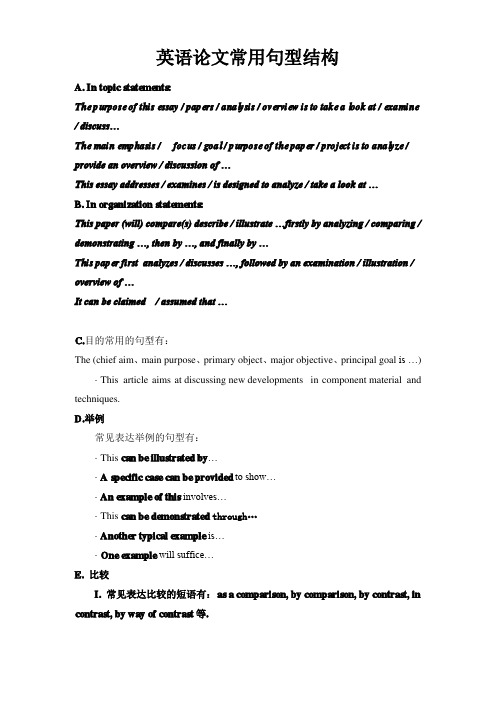
英语论文常用句型结构A. In topic statements:The purpose of this essay / papers / analysis / overview is to take a look at / examine / discuss…The main emphasis /focus / goal / purpose of the paper / project is to analyze / provide an overview / discussion of …This essay addresses / examines / is designed to analyze / take a look at …B. In organization statements:This paper (will) compare(s) describe / illustrate …firstly by analyzing / comparing / demonstrating …, then by …, and finally by …This paper first analyzes / discusses …, followed by an examination / illustration / overview of …It can be claimed/ assumed that …C.目的常用的句型有:The (chief aim、main purpose、primary object、major objective、principal goal is …)· This article aims at discussing new developments in component material and techniques.D.举例常见表达举例的句型有:· This can be illustrated by…·A specific case can be provided to show…·An example of this involves…· This can be demonstrated through…·Another typical example is…·One example will suffice…E.比较I.常见表达比较的短语有:as a comparison, by comparison, by contrast, in contrast, by way of contrast等.II.不同于A be different、distinct from B、distinguished· We must distinguish sliding friction from rolling friction.III.相当于· be equivalent to、corresponds to。
英语科技论文写作的常用句式
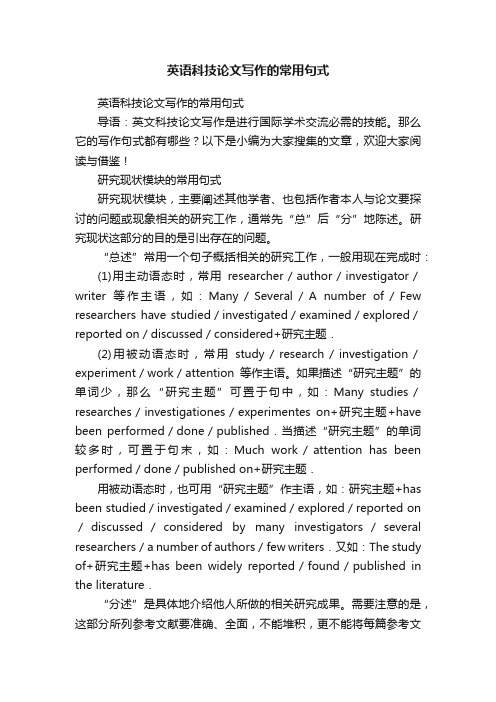
英语科技论文写作的常用句式英语科技论文写作的常用句式导语:英文科技论文写作是进行国际学术交流必需的技能。
那么它的写作句式都有哪些?以下是小编为大家搜集的文章,欢迎大家阅读与借鉴!研究现状模块的常用句式研究现状模块,主要阐述其他学者、也包括作者本人与论文要探讨的问题或现象相关的研究工作,通常先“总”后“分”地陈述。
研究现状这部分的目的是引出存在的问题。
“总述”常用一个句子概括相关的研究工作,一般用现在完成时:(1)用主动语态时,常用researcher/author/investigator/writer等作主语,如:Many/Several/A number of/Few researchers have studied/investigated/examined/explored/reported on/discussed/considered+研究主题.(2)用被动语态时,常用study/research/investigation/experiment/work/attention等作主语。
如果描述“研究主题”的单词少,那么“研究主题”可置于句中,如:Many studies/researches/investigationes/experimentes on+研究主题+have been performed/done/published.当描述“研究主题”的单词较多时,可置于句末,如:Much work/attention has been performed/done/published on+研究主题.用被动语态时,也可用“研究主题”作主语,如:研究主题+has been studied/investigated/examined/explored/reported on /discussed/considered by many investigators/several researchers/a number of authors/few writers.又如:The study of+研究主题+has been widely reported/found/published in the literature.“分述”是具体地介绍他人所做的相关研究成果。
英语科技论文常用句型结构-new
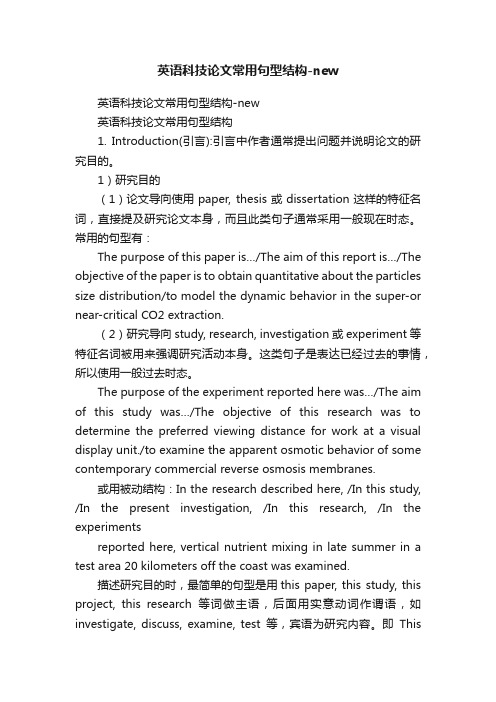
英语科技论文常用句型结构-new英语科技论文常用句型结构-new英语科技论文常用句型结构1. Introduction(引言):引言中作者通常提出问题并说明论文的研究目的。
1)研究目的(1)论文导向使用paper, thesis或dissertation这样的特征名词,直接提及研究论文本身,而且此类句子通常采用一般现在时态。
常用的句型有:The purpose of this paper is…/The aim of this report is…/The objective of the paper is to obtain quantitative about the particles size distribution/to model the dynamic behavior in the super-or near-critical CO2 extraction.(2)研究导向study, research, investigation或experiment等特征名词被用来强调研究活动本身。
这类句子是表达已经过去的事情,所以使用一般过去时态。
The purpose of the experiment reported here was…/The aim of this study was…/The objective of this research was to determine the preferred viewing distance for work at a visual display unit./to examine the apparent osmotic behavior of some contemporary commercial reverse osmosis membranes.或用被动结构:In the research described here, /In this study, /In the present investigation, /In this research, /In the experimentsreported here, vertical nutrient mixing in late summer in a test area 20 kilometers off the coast was examined.描述研究目的时,最简单的句型是用this paper, this study, this project, this research等词做主语,后面用实意动词作谓语,如investigate, discuss, examine, test等,宾语为研究内容。
英文科技论文写作常用句型
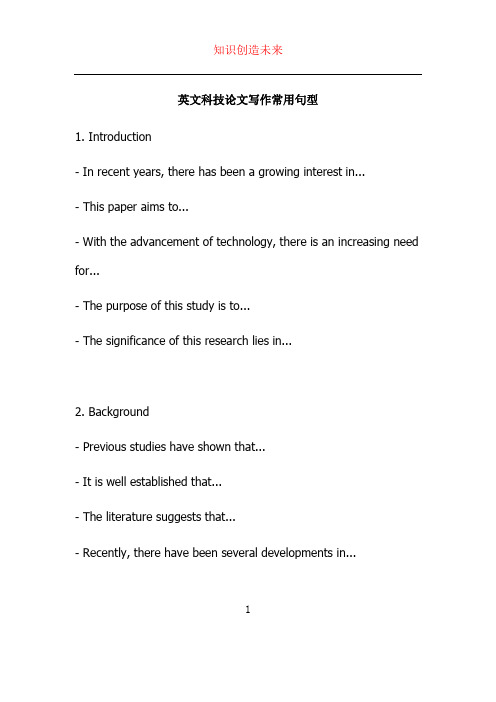
英文科技论文写作常用句型1. Introduction- In recent years, there has been a growing interest in...- This paper aims to...- With the advancement of technology, there is an increasing need for...- The purpose of this study is to...- The significance of this research lies in...2. Background- Previous studies have shown that...- It is well established that...- The literature suggests that...- Recently, there have been several developments in...13. Objectives- The main objective of this research is to...- Our primary goal is to...- The specific objectives of this study include...4. Methodology- This study employed a quantitative/qualitative research method. - Data were collected through surveys/interviews/observations.- A random sample was selected/Participants were recruited from... - The data analysis involved...5. Results- The findings of this study indicate that...- The results reveal that...- It was observed that...2- The data show a significant correlation between...6. Discussion- The results of this study are consistent with previous research. - These findings suggest that...- The implications of these results are...- It is worth noting that...- Further research is needed to...7. Conclusion- In conclusion,...- This study contributes to the understanding of...- These findings have important implications for...- The results of this research can be applied to...- Future research should focus on...38. Limitations- One limitation of this study is...- It is important to acknowledge the limitations of this research. - The sample size was relatively small, which may limit generalizability.- The study was conducted in a specific context, which may limit the applicability of the findings.9. Recommendations- Based on the findings, it is recommended that...- Future research should consider...- In light of these results, it is suggested that...- It would be beneficial to...410. Future directions- Future research should explore...- It would be interesting to investigate...- This study opens up avenues for future research on... - Further investigation is needed to establish...5。
高中英语科技类作文通用句型
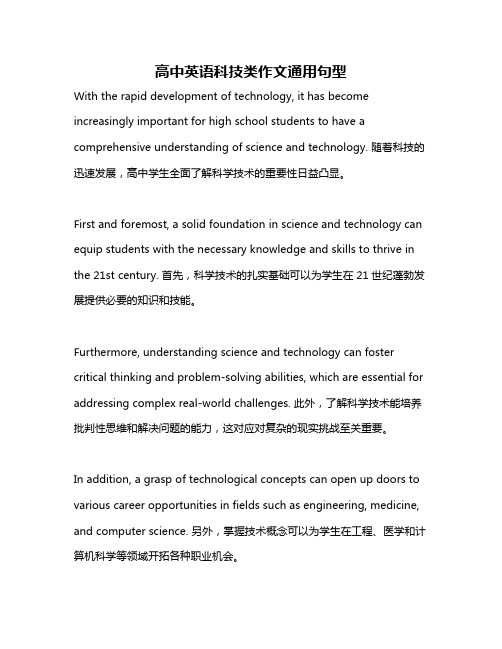
高中英语科技类作文通用句型With the rapid development of technology, it has become increasingly important for high school students to have a comprehensive understanding of science and technology. 随着科技的迅速发展,高中学生全面了解科学技术的重要性日益凸显。
First and foremost, a solid foundation in science and technology can equip students with the necessary knowledge and skills to thrive in the 21st century. 首先,科学技术的扎实基础可以为学生在21世纪蓬勃发展提供必要的知识和技能。
Furthermore, understanding science and technology can foster critical thinking and problem-solving abilities, which are essential for addressing complex real-world challenges. 此外,了解科学技术能培养批判性思维和解决问题的能力,这对应对复杂的现实挑战至关重要。
In addition, a grasp of technological concepts can open up doors to various career opportunities in fields such as engineering, medicine, and computer science. 另外,掌握技术概念可以为学生在工程、医学和计算机科学等领域开拓各种职业机会。
科技英语写作常用词组、句型总结
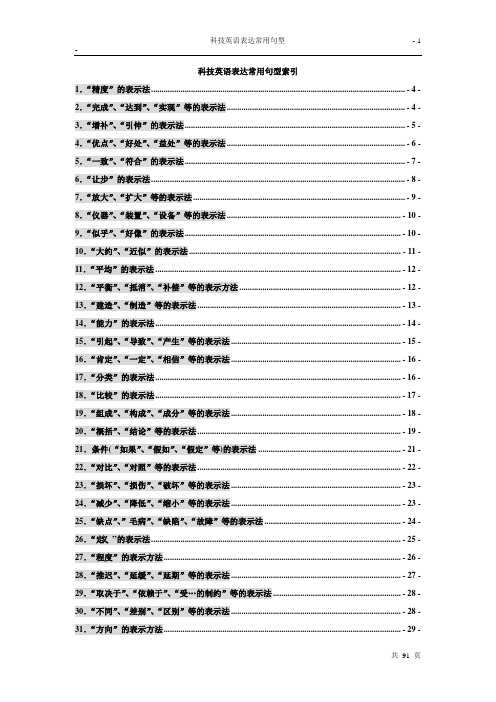
科技英语表达常用句型索引1.“精度”的表示法......................................................................................................................... - 4 -2.“完成”、“达到”、“实现”等的表示法 ..................................................................................... - 4 -3.“增补”、“引伸”的表示法......................................................................................................... - 5 -4.“优点”、“好处”、“益处”等的表示法 ..................................................................................... - 6 -5.“一致”、“符合”的表示法......................................................................................................... - 7 -6.“让步”的表示法......................................................................................................................... - 8 -7.“放大”、“扩大”等的表示法 ..................................................................................................... - 9 -8.“仪器”、“装置”、“设备”等的表示法 ................................................................................... - 10 -9.“似乎”、“好像”的表示法....................................................................................................... - 10 -10.“大约”、“近似”的表示法 ..................................................................................................... - 11 -11.“平均”的表示法 ..................................................................................................................... - 12 -12.“平衡”、“抵消”、“补偿”等的表示方法 ............................................................................. - 12 -13.“建造”、“制造”等的表示法 ................................................................................................. - 13 -14.“能力”的表示法..................................................................................................................... - 14 -15.“引起”、“导致”、“产生”等的表示法 ................................................................................. - 15 -16.“肯定”、“一定”、“相信”等的表示法 ................................................................................. - 16 -17.“分类”的表示法..................................................................................................................... - 16 -18.“比较”的表示法..................................................................................................................... - 17 -19.“组成”、“构成”、“成分”等的表示法 ................................................................................. - 18 -20.“概括”、“结论”等的表示法 ................................................................................................. - 19 -21.条件(“如果”、“假如”、“假定”等)的表示法 .................................................................... - 21 -22.“对比”、“对照”等的表示法 ................................................................................................. - 22 -23.“损坏”、“损伤”、“破坏”等的表示法 ................................................................................. - 23 -24.“减少”、“降低”、“缩小”等的表示法 ................................................................................. - 23 -25.“缺点”、”毛病”、“缺陷”、“故障”等的表示法 ................................................................. - 24 -26.“定义”的表示法....................................................................................................................... - 25 -27.“程度”的表示方法................................................................................................................. - 26 -28.“推迟”、“延缓”、“延期”等的表示法 ................................................................................. - 27 -29.“取决于”、“依赖于”、“受…的制约”等的表示法 ............................................................. - 28 -30.“不同”、“差别”、“区别”等的表示法 ................................................................................. - 28 -31.“方向”的表示方法................................................................................................................. - 29 -32.“距离”、“间距”、“间隔”等的表示法 ................................................................................. - 32 -33.图的表示法............................................................................................................................... - 34 -34.“例证”、“举例”等的表示法 ................................................................................................. - 35 -35.“例外”、“排除”等的表示法 ................................................................................................. - 36 -36.“过量”、“过度”等的表示法 ................................................................................................. - 37 -37.“频度”、“时间间隔”等的表示法 ......................................................................................... - 38 -38.“功能”、“作用”等的表示法 ................................................................................................. - 39 -39.“将来时间”的表示法............................................................................................................. - 39 -40.“根据”的表示法..................................................................................................................... - 40 -41.“假定”、“假设”的表示法 ..................................................................................................... - 41 -42.“增加”、“增大”、“提高”等的表示法 ................................................................................. - 42 -43.“安装”、“安置”等的表示法 ................................................................................................. - 43 -44.“指示”、“指令”等的表示法 ................................................................................................. - 44 -45.“相似”、“类似”、“相同”等的表示法 ................................................................................. - 45 -46.“装填”的表示法..................................................................................................................... - 45 -47.“最大值”、“最小值”等的表示法 ......................................................................................... - 46 -48.“度量”、“计量”等的表示法 ................................................................................................. - 47 -49.“方法”的表示法..................................................................................................................... - 48 -50.“运动”、“移动”、“动作”等的表示法 ................................................................................. - 49 -51.“需要”、“要求”、“必须”等的表示法 ................................................................................. - 50 -52.“否定”的表示法..................................................................................................................... - 51 -53.“加、减、乘、除”等运算的表示法 ..................................................................................... - 52 -54.“百分比”的表示法................................................................................................................. - 53 -55.“位置”的表示法..................................................................................................................... - 54 -56.“可能性”、“或然性”等的表示法 ......................................................................................... - 55 -57.“性质”、“特性”、“性能”等的表示法 ................................................................................. - 56 -58.“比例”、“比率”等的表示法 ................................................................................................. - 57 -59.“数量”的表示法..................................................................................................................... - 59 -60.“原因”、“理由”等的表示法 ................................................................................................. - 60 -61.“结果”的表示法..................................................................................................................... - 62 -62.“转动”、“旋转”等的表示法 ................................................................................................. - 63 -64.“顺序”、“时序”等的表示法 ................................................................................................. - 66 -65.“形状”的表示法..................................................................................................................... - 67 -66.“状态”、“状况”等的表示法 ................................................................................................. - 69 -67.“足够(量)”、“不足”等的表示法 .......................................................................................... - 70 -68.“建议”、“提议”、“劝告”等的表示法 ................................................................................. - 71 -69.“提供”、“供给”、“装备”等的表示法 ................................................................................. - 72 -70.“趋向”、“趋势”、“倾向”等的表示法 ................................................................................. - 73 -71.“何时”的表示法..................................................................................................................... - 74 -72.“倍数”、“分数”、“百分数”等的表示法 ............................................................................. - 76 -73.“过量”的表示法..................................................................................................................... - 80 -74.“传送”、“传输”、“输送”等的表示法 ................................................................................. - 81 -75.“变化”的表示法..................................................................................................................... - 82 -76.“经受”、“承受”等的表示法 ................................................................................................. - 84 -77.“变量”的表示法..................................................................................................................... - 85 -78.“改变”、“变化”、“修改”等的表示法 ................................................................................. - 86 -79.“速度”、“速率”等的表示法 ................................................................................................. - 87 -80.“方式”、“方法”、“手段”等的表示法 ................................................................................. - 88 -81.“愿望”的表示法..................................................................................................................... - 89 -1.“精度”的表示法常用词语有:to an accuracy of… 精度达…;达…的精度with an accuracy of… 精度达…;以…的精度within the accuracy of… 在…的精度范围内the accuracy with/to which… …的精度accurate to… 精度达…;精确到…accurate (to) within… 精度在…的范围之内Readings can be obtained to an accuracy of one micron.获得的读书精度可达1微米。
- 1、下载文档前请自行甄别文档内容的完整性,平台不提供额外的编辑、内容补充、找答案等附加服务。
- 2、"仅部分预览"的文档,不可在线预览部分如存在完整性等问题,可反馈申请退款(可完整预览的文档不适用该条件!)。
- 3、如文档侵犯您的权益,请联系客服反馈,我们会尽快为您处理(人工客服工作时间:9:00-18:30)。
英语科技论文常用句型结构-new英语科技论文常用句型结构1. Introduction(引言):引言中作者通常提出问题并说明论文的研究目的。
1)研究目的(1)论文导向使用paper, thesis或dissertation这样的特征名词,直接提及研究论文本身,而且此类句子通常采用一般现在时态。
常用的句型有:The purpose of this paper is…/The aim of this report is…/The objective of the paper is to obtain quantitative about the particles size distribution/to model the dynamic behavior in the super-or near-critical CO2 extraction.(2)研究导向study, research, investigation或experiment等特征名词被用来强调研究活动本身。
这类句子是表达已经过去的事情,所以使用一般过去时态。
The purpose of the experiment reported here was…/The aim of this study was…/The objective of this research was to determine the preferred viewing distance for work at a visual display unit./to examine the apparent osmotic behavior of some contemporary commercial reverse osmosis membranes.或用被动结构:In the research described here, /In this study, /In the present investigation, /In this research, /In the experimentsreported here, vertical nutrient mixing in late summer in a test area 20 kilometers off the coast was examined.描述研究目的时,最简单的句型是用this paper, this study, this project, this research等词做主语,后面用实意动词作谓语,如investigate, discuss, examine, test等,宾语为研究内容。
即This paper/This study/This project/The present study/This research/Our project/This survey/This thesis concerns/tests/investigates/reports/discusses/describes/explains/calcul ates/examines/analyses/proposes/demonstrates/evaluates/measures….2)研究价值Although much research has been devoted to A, /While much work has been done on A, /Although many studies have been published concerning A, / While many researchers have investigated A, /Although much literature is available on A, little research has been done on B. / little attention has been paid to B. /little information is available on B. / little work has been published on B. /few researchers have studied B. / few studies have investigated B.在这一步骤中,作者通过指明过去相关研究中尚未处理或解决的问题或所派生出的新问题,常用句型的时态是一般现在时和现在完成时。
2. Body (正文)1)theory base理论分析的常用句型在正文部分的假设、理论分析、数理模型的建立以及计算过程中,常常要推导并描述公式,作者应了解和掌握描述公式的基本句型。
科技论文理论分析部分中资料大部分表达数字与逻辑关系,句型使用一般现在时态。
Substituting M in/into N, we obtain/have/get ….Substituting M/Substitution of M in/into N gives/yields/ produces/ results in….Let us now consider the case: the dynamic link parameters are unknown.If m=1.2, then we have the following equations:….Given that m =1.2, we obtain….The equation for Aˊcan be written(expressed)as….The relationship between m and n is as follows:….A is inversely proportional to B, as shown below.If the same material is used, the above equation reduces to….We will now reduce Eq. (3) to a simpler form:….The mass velocity G is defined as.…We will now integrate Equation (2) in order to derive the solution.2) diagram图表文字说明中的常用句型在文字说明中,如果提及图表,表格用“Table+序号”表示,如“Table 1 shows…”。
其他各种类型的图都可以用“Figure+序号”表示,如“From Figure 2 we learn…”。
“Figure”这个词可以简缩为“Fig.”,但必须做到前后统一,如用缩写,便都用缩写。
动词要用一般现在时态。
常用动词有show, provide, give, present, summarize, illustrate, reveal, display, indicate, suggest 等。
例如:·Table 1 shows the majority of the participants have previous knowledge of the elements of a safe well.·Table 2 provides details of the test results.·Figure 4.2 gives the results of the experiment.·Both of these questions receive very high ratings (see Table1).·The results show that 92% used information on water testing in local news outlets (Figure2).动词的语态可以灵活使用,这样能使句型多样化,上述句型也可变为被动语态。
· As shown in Table 3, …· As can be seen from the data in Table 1, …· As described on page 24, …3)result介绍研究成果的常用句型(1)根据本人的研究结果做出推论。
These results suggest that untrained octopuses can learn a task more quickly by observing the behavior of another octopus than by reward-and-punishment methods.(2)作者解释研究结果或说明产生研究结果的原因。
These findings are understandable because the initialannealing temperature dictates the state of conformational structures.(3)作者对此次研究结果与其他研究者曾发生的结果作比较。
These results agree with Gerner’s analysis, in that Q max varies inversely with length and to the third power of the pipe width.The recognition rate of our system is significantly higher than that reported for Token’s system.(4)作者指出自己的理论模型是否与实验数据符合。
The measured temperatures along the heat pipe are all highly consistent with the predictions of the theoretical model.The experimental measurements are very close to the predicted values.·There is a high level of agreement between the theoretical predictions and the experimental data.从以上句型中可以看出学术论文在陈述研究成果时,通常使用一般现在时态。
当评论的内容为对研究结果可能的证明时,句子的主要动词之前通常加上may或can等一般现在时态的情态动词。
